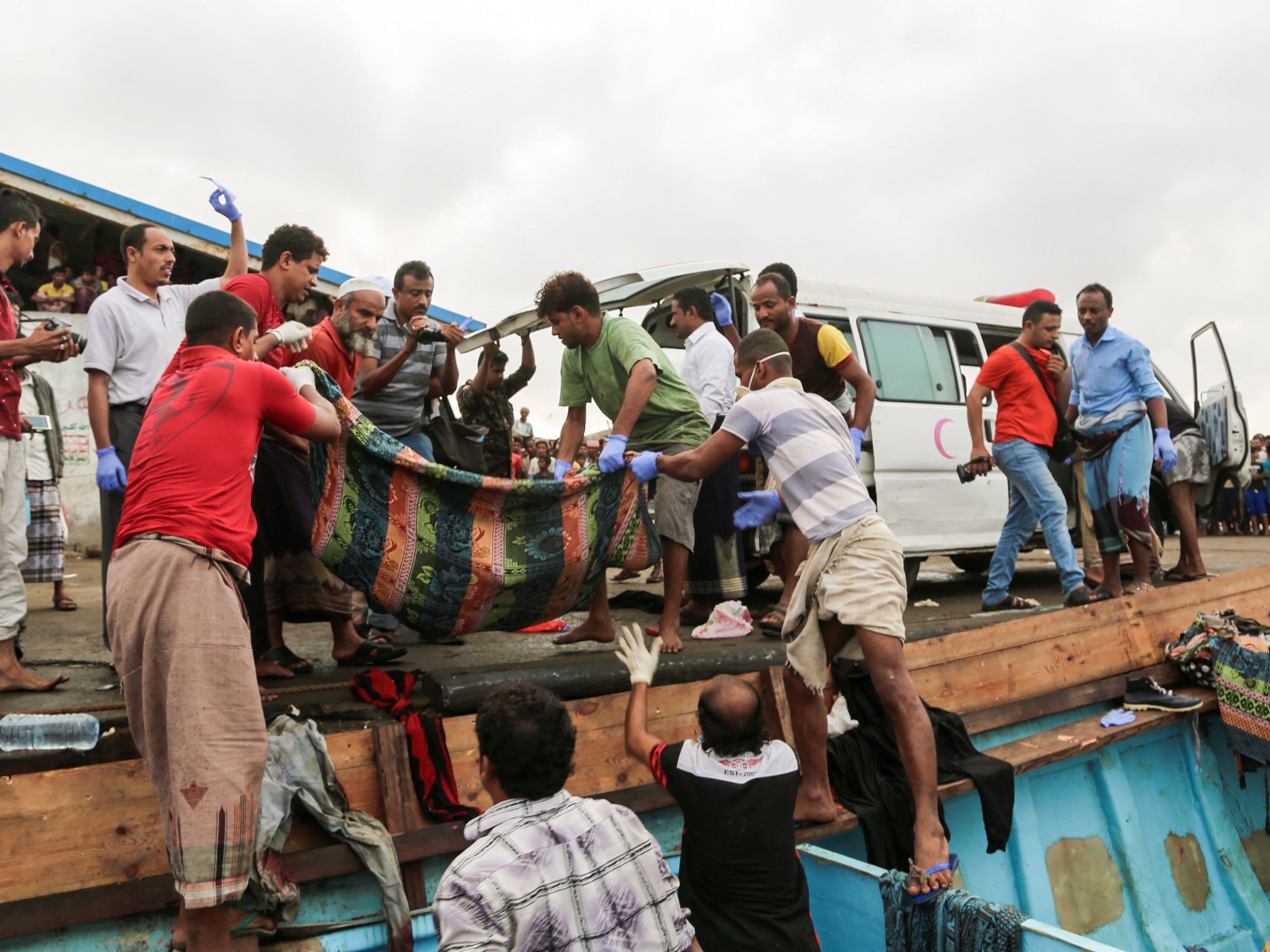Saudi-led coalition blamed after helicopter gunship massacres Somali refugees
Terrified migrants wave flashlights to show they are not militants, but dozens die before helicopter stops spraying bullets

Your support helps us to tell the story
From reproductive rights to climate change to Big Tech, The Independent is on the ground when the story is developing. Whether it's investigating the financials of Elon Musk's pro-Trump PAC or producing our latest documentary, 'The A Word', which shines a light on the American women fighting for reproductive rights, we know how important it is to parse out the facts from the messaging.
At such a critical moment in US history, we need reporters on the ground. Your donation allows us to keep sending journalists to speak to both sides of the story.
The Independent is trusted by Americans across the entire political spectrum. And unlike many other quality news outlets, we choose not to lock Americans out of our reporting and analysis with paywalls. We believe quality journalism should be available to everyone, paid for by those who can afford it.
Your support makes all the difference.Somalia has blamed the Saudi-led coalition for an attack on a boat off Yemen’s coast that killed at least 42 Somali refugees.
The attack, by a military vessel and a helicopter gunship, was condemned by the Mogadishu Government, which urged the US-led coalition to investigate.
The boat was packed with dozens of refugees – some women and children – and was more than 30 miles of the coast when it came under fire.
The Saudi-led coalition is fighting Iranian-backed Shia rebels in the country amid a bitter civil war.
“What happened there was a horrific and terrible problem inflicted on innocent Somali people. The Saudi-led coalition fighting in Yemen is responsible for it,” Somalia's foreign minister, Abdisalam Omer, said on state-run radio.
He added that Yemen's government must give an explanation for the attack, which left around 80 people with injuries, and that those responsible must be brought to justice.
Somali Prime Minister Hassan Ali Khaire, in a separate statement, called the incident “atrocious” and “appalling".
Yemen's Shia rebels also have blamed the Saudi-led coalition. The alliance did not immediately respond.
The incident draws attention to the dangers of the Gulf of Aden, one part of a busy migration route stretching from the Horn of Africa to the Gulf states through the Yemen war zone.
Laurent De Boeck, the head of the Yemeni office for the International Organisation for Migration, said the agency believes all those on board the boat were registered refugees.
A Yemeni man who survived the attack said the refugees had been trying to reach Sudan, but Somalia's foreign minister said their ultimate destination had been Somalia.
The surviver, Al-Hassan Ghaleb Mohammed, said the boat left from Ras Arra, along the southern coastline in Yemen's Hodeida province, and was near the Bab al-Mandab Strait when the attack occurred.
Mr Mohammed described a scene of panic in which the terrified refugees waved flashlights, apparently to show they were not combatants. He said the helicopter then stopped firing, but only after dozens had been killed.
Video of the aftermath showed dozens of slain migrants, along with others who suffered gunshot wounds, lost limbs, or had broken arms and legs.
The Saudi-led coalition has been heavily bombarding the coast around the port of Hodeida, where it accuses the rebels, known as the Houthis, of smuggling weapons in small boats.
The coalition began striking the rebels and their allies in March 2015, hoping to drive the rebels from the capital, Sanaa, and restore the internationally recognised government. The rebels remain in control of Sanaa and much of northern Yemen, and the conflict, which has killed an estimated 10,000 civilians, is in a stalemate.
Since the beginning of the air campaign, Yemen has been under an air and sea embargo. The coalition is the only party to the conflict with naval and air forces, and rights groups have documented hundreds of air strikes in which civilians have been killed.
Despite the fighting, African migrants continue to arrive in the war-torn country, where there is no central authority to prevent them from travelling onward to a better life in neighbouring oil-rich Saudi Arabia.
More than 111,500 migrants landed on Yemen's shores last year, up from around 100,000 the year before, according to the Regional Mixed Migration Secretariat, a grouping of international agencies that monitors migration in the area.
The turmoil has left migrants vulnerable to abuse at the hands of the armed trafficking rings, many of which are believed to be connected to the multiple armed groups involved in the war.
Refugees have fled Somalia over its past quarter-century of chaos, desperate to avoid warlord-led clashes, attacks by homegrown extremist group al-Shabab and deadly drought.
Associated Press contributed to this report
Join our commenting forum
Join thought-provoking conversations, follow other Independent readers and see their replies
Comments